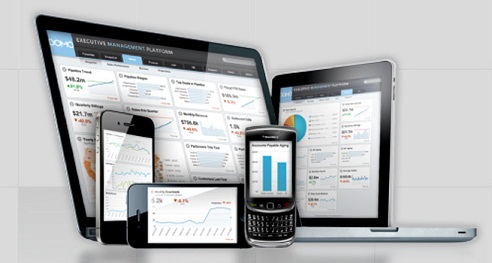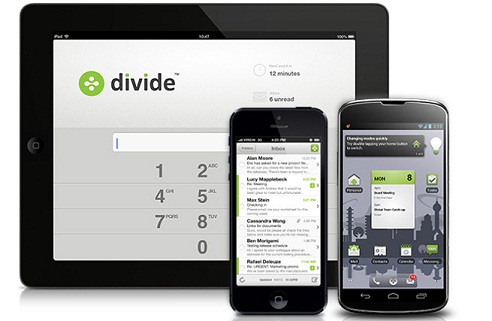6 startups that change the use of mobile devices in the enterprise
Powerful mobile devices have already penetrated to jobs and are not going to go away from there. So far, by order of the heads of companies, the heads of IT departments are trying to develop appropriate policies to make the use of mobile devices at work the employees, ignoring the existing rules, are already using them.
 There are a large number of mobile devices on the market. Despite the fact that the most popular operating system for smartphones is Android, according to a recent report from Good Technologies , it seems that companies are more likely to choose iOS devices. The iPad still has a strong influence on executives , but one can observe a shift of interest towards tablets on Windows 8, since they can run native applications on which they rely on enterprises. Also recently, Microsoft announced that business had the opportunity to acquire their outstanding Surface tablet .
There are a large number of mobile devices on the market. Despite the fact that the most popular operating system for smartphones is Android, according to a recent report from Good Technologies , it seems that companies are more likely to choose iOS devices. The iPad still has a strong influence on executives , but one can observe a shift of interest towards tablets on Windows 8, since they can run native applications on which they rely on enterprises. Also recently, Microsoft announced that business had the opportunity to acquire their outstanding Surface tablet .
One of the six main topics of the Mobile Summit VentureBeats, which will be held on April 1, will be “Mobile devices in enterprises - what's next?”. Against the background of interest in this topic, we want to highlight a few startups that are already thinking about the problem and are working energetically in this direction.
')
These 6 startups change the place of mobile devices in the enterprise when it comes to the convenience of performing work tasks on a mobile device, business analysis, or increased security.

The solution from Armor5 does not involve installing applications on the device. Their software connects to the company’s network through an existing VPN connection and, through generated URLs, provides secure access to company data and cloud applications for employees who use smartphones and tablets.
Thus, your employees always have access to everything they need to work without the risk that any sensitive data will be stored on their devices.
The developer company is located in Santa Clara, California. In February, she raised $ 2 million in the first round of investment, from such funds as: Trinity Ventures, Nexus Venture Partners and the Citrix Startup Accelerator.

Domo offers a business intelligence panel, access to which, according to the developer, is possible from any device, in particular from a mobile. The developer claims that his software is easy to use and is based on cloud technologies, thanks to which you can make important decisions based on data received and displayed in real time.
Representatives of Domo shy away from disclosing all the possibilities of their offer, but the company already has more than 100 corporate customers, and they are going to finish the closed beta test this year.
The company is located in American Fork, in close proximity to Salt Lake City. They recently received a huge $ 60 million investment from GGV Capital, Greylock Partners, Bezos Expeditions, Founders Fund and others, bringing the total investment received to $ 113 million.

Enterproid's Divide platform is a more formal approach to using mobile devices at work, using software to separate personal and professional. You can install Devide on iPhone or Android and know that your work and personal items are completely separate.
Perhaps the most important thing for employers is that the storage of information inside Devide is safe, and, if necessary, at any time by a signal from the company it can be deleted.
In the iPhone, the solution looks like a container application, within which your working email and business applications exist. On Android, Devide offers different profiles and you can switch between them, having 2 completely separate sets from the home screen and applications.
Enterproid based in New York was introduced at Demo Springs 2011, receiving $ 13 million in investments from Comcast Ventures, Google Ventures, Qualcomm Ventures, Genacast Ventures and NYC Seed. The company has more than 75 employees.

MobileSpaces is located in San Francisco, their approach to mobile devices in enterprises places a strong emphasis on employee privacy. The solution they offer allows owners of Android-based phones to mark all the applications they want to use for work, and only these applications will have access to the systems and enterprise data.
Currently, the company is also testing a version for iOS, which will be ready by mid-2013.
MobileSpaces has already received $ 3 million of investment from Accel Partners, the company told us that their official launch will take place soon.
MobileSpaces CEO and former vice president of McAfee David Goldschlag told us in August of this year: “When leaving the company, the company reserves the right to work-related data. We give enterprises the opportunity to comfortably co-exist with the employees needed for work and personal applications on mobile devices. ”

Mocana relies on the solution of the biggest problem - the security of using mobile devices in the enterprise, in two ways. She has a solution for devices connected to the corporate network and mobile applications.
In particular, an interface between company data and a connected device is created using proprietary software, the interface allows you to monitor device usage or encrypt data.
However, for devices, only a set of self-developed applications is offered (you can use them, for example, with Google Drive or Box).
Mocana is located in San Francisco and has already received $ 32 million from investors, including: Trident Capital, Intel Capital, Symantec, Shasta Ventures, and Southern Cross Venture Partners.

The San Diego startup Roambi is trying to solve the problem of business intelligence on mobile devices through its popular applications for iPad and iPhone. The application receives data from various sources and conveniently displays it in various ways so that managers can make optimal decisions in real time.
The company also offers an iPad app called Flow , which makes it very easy to create, publish and share colorful reports.
Investments in them, among investors fund Sequoia Capital, has already amounted to more than 50 million dollars .
Recently, in a guest post for us, Roambis CEO described how companies can unlock the potential of using mobile devices when working on data analysis .
 There are a large number of mobile devices on the market. Despite the fact that the most popular operating system for smartphones is Android, according to a recent report from Good Technologies , it seems that companies are more likely to choose iOS devices. The iPad still has a strong influence on executives , but one can observe a shift of interest towards tablets on Windows 8, since they can run native applications on which they rely on enterprises. Also recently, Microsoft announced that business had the opportunity to acquire their outstanding Surface tablet .
There are a large number of mobile devices on the market. Despite the fact that the most popular operating system for smartphones is Android, according to a recent report from Good Technologies , it seems that companies are more likely to choose iOS devices. The iPad still has a strong influence on executives , but one can observe a shift of interest towards tablets on Windows 8, since they can run native applications on which they rely on enterprises. Also recently, Microsoft announced that business had the opportunity to acquire their outstanding Surface tablet .One of the six main topics of the Mobile Summit VentureBeats, which will be held on April 1, will be “Mobile devices in enterprises - what's next?”. Against the background of interest in this topic, we want to highlight a few startups that are already thinking about the problem and are working energetically in this direction.
')
These 6 startups change the place of mobile devices in the enterprise when it comes to the convenience of performing work tasks on a mobile device, business analysis, or increased security.

Armor5
The solution from Armor5 does not involve installing applications on the device. Their software connects to the company’s network through an existing VPN connection and, through generated URLs, provides secure access to company data and cloud applications for employees who use smartphones and tablets.
Thus, your employees always have access to everything they need to work without the risk that any sensitive data will be stored on their devices.
The developer company is located in Santa Clara, California. In February, she raised $ 2 million in the first round of investment, from such funds as: Trinity Ventures, Nexus Venture Partners and the Citrix Startup Accelerator.

Domo
Domo offers a business intelligence panel, access to which, according to the developer, is possible from any device, in particular from a mobile. The developer claims that his software is easy to use and is based on cloud technologies, thanks to which you can make important decisions based on data received and displayed in real time.
Representatives of Domo shy away from disclosing all the possibilities of their offer, but the company already has more than 100 corporate customers, and they are going to finish the closed beta test this year.
The company is located in American Fork, in close proximity to Salt Lake City. They recently received a huge $ 60 million investment from GGV Capital, Greylock Partners, Bezos Expeditions, Founders Fund and others, bringing the total investment received to $ 113 million.

Enterproid
Enterproid's Divide platform is a more formal approach to using mobile devices at work, using software to separate personal and professional. You can install Devide on iPhone or Android and know that your work and personal items are completely separate.
Perhaps the most important thing for employers is that the storage of information inside Devide is safe, and, if necessary, at any time by a signal from the company it can be deleted.
In the iPhone, the solution looks like a container application, within which your working email and business applications exist. On Android, Devide offers different profiles and you can switch between them, having 2 completely separate sets from the home screen and applications.
Enterproid based in New York was introduced at Demo Springs 2011, receiving $ 13 million in investments from Comcast Ventures, Google Ventures, Qualcomm Ventures, Genacast Ventures and NYC Seed. The company has more than 75 employees.

Mobilespaces
MobileSpaces is located in San Francisco, their approach to mobile devices in enterprises places a strong emphasis on employee privacy. The solution they offer allows owners of Android-based phones to mark all the applications they want to use for work, and only these applications will have access to the systems and enterprise data.
Currently, the company is also testing a version for iOS, which will be ready by mid-2013.
MobileSpaces has already received $ 3 million of investment from Accel Partners, the company told us that their official launch will take place soon.
MobileSpaces CEO and former vice president of McAfee David Goldschlag told us in August of this year: “When leaving the company, the company reserves the right to work-related data. We give enterprises the opportunity to comfortably co-exist with the employees needed for work and personal applications on mobile devices. ”

Mocana
Mocana relies on the solution of the biggest problem - the security of using mobile devices in the enterprise, in two ways. She has a solution for devices connected to the corporate network and mobile applications.
In particular, an interface between company data and a connected device is created using proprietary software, the interface allows you to monitor device usage or encrypt data.
However, for devices, only a set of self-developed applications is offered (you can use them, for example, with Google Drive or Box).
Mocana is located in San Francisco and has already received $ 32 million from investors, including: Trident Capital, Intel Capital, Symantec, Shasta Ventures, and Southern Cross Venture Partners.

Roambi
The San Diego startup Roambi is trying to solve the problem of business intelligence on mobile devices through its popular applications for iPad and iPhone. The application receives data from various sources and conveniently displays it in various ways so that managers can make optimal decisions in real time.
The company also offers an iPad app called Flow , which makes it very easy to create, publish and share colorful reports.
Investments in them, among investors fund Sequoia Capital, has already amounted to more than 50 million dollars .
Recently, in a guest post for us, Roambis CEO described how companies can unlock the potential of using mobile devices when working on data analysis .
Source: https://habr.com/ru/post/174879/
All Articles